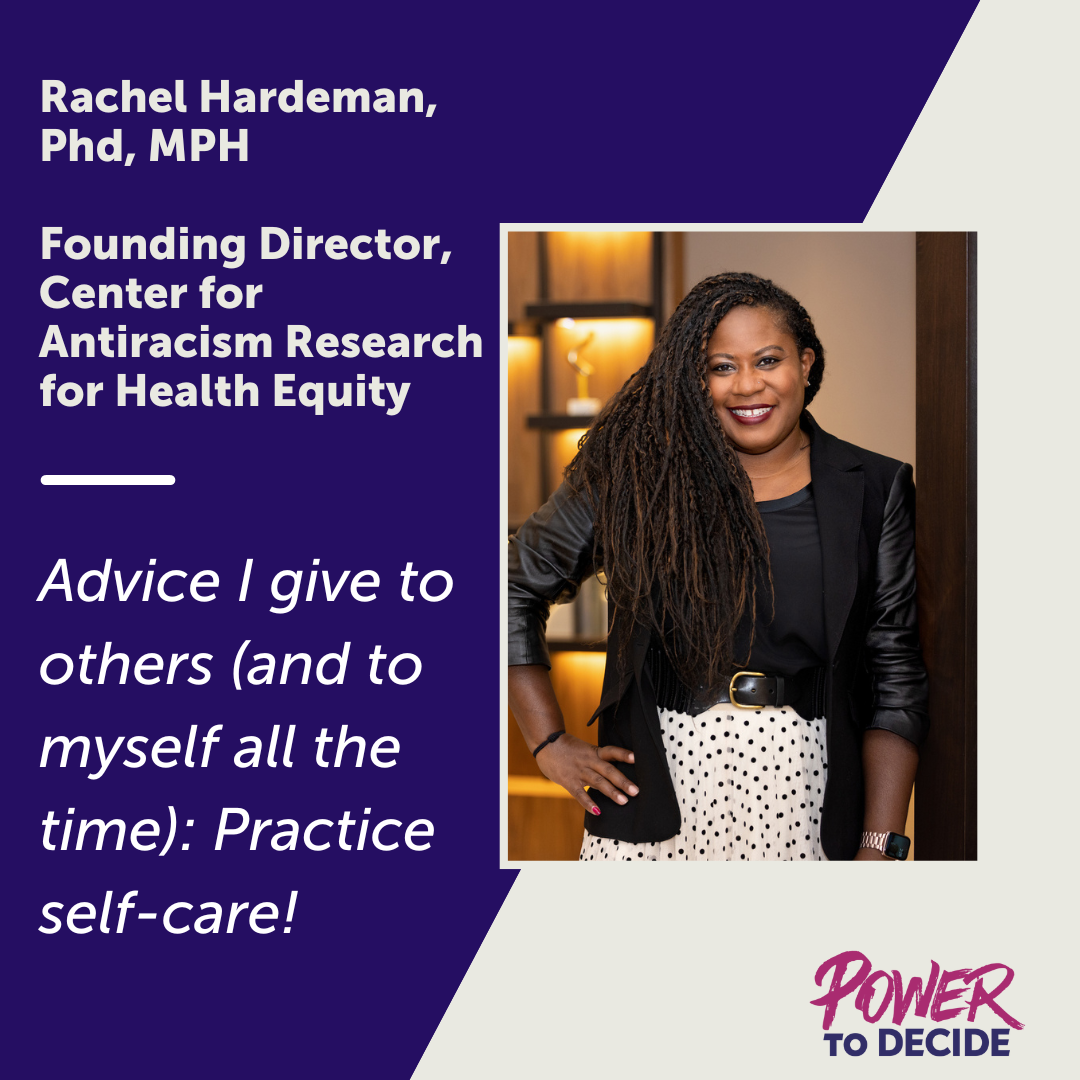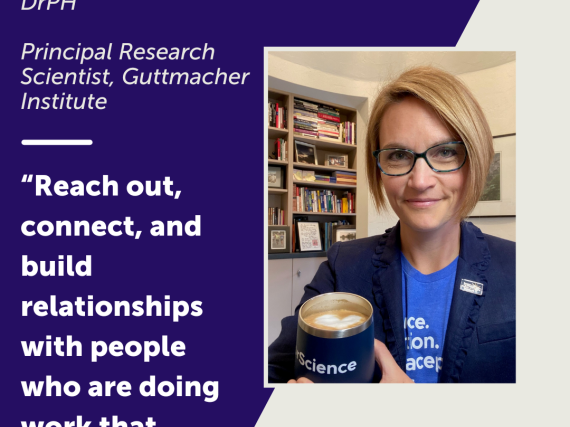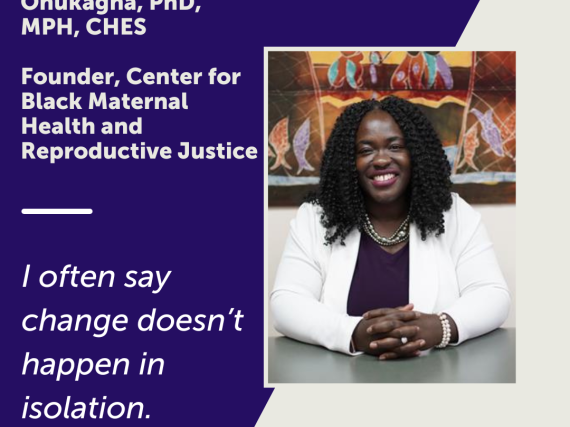November 2023 Power Player
At Power to Decide, we’re committed to uplifting the many individuals on the ground doing the work that matters most. As part of this commitment, we regularly highlight an individual who is championing the effort to support people’s reproductive well-being. Check out our newest Power Player profile.
Rachel Hardeman, Phd, MPH, she/her
Founding Director, Center for Antiracism Research for Health Equity
What work have you done to ensure that all people have the information and access they need to make decisions that align with their intentions and improve their reproductive well-being?
Here in Minnesota, Black and Indigenous birthing people are 3-4x as likely to die during pregnancy or in the year after childbirth than white counterparts, and their babies are 2x as likely to die before reaching their first birthday than white babies. And just last week we learned from a national report that the infant mortality rate rose in the US for the first time in decades.
Racial inequities in maternal and infant mortality are because of racism, not race. Structural racism weathers on the bodies of birthing people of color, affects their access to resources and reproductive health care, and subjects them to discrimination in health settings.
Racism is a public health crisis, but it's also a fixable problem! Antiracism is the key to those solutions. That has been the driving force in my career, and it is why I founded the Center for Antiracism Research for Health Equity (CARHE, pronounced "care").
As an example of antiracist solutions, I have a long-term partnership with Roots Community Birth Center in Minneapolis (Roots). Roots has an antiracist care-model that centers culture and relationships in their care. Our research has shown that Roots' care can improve health outcomes and self-reported feelings of respect and care for Black birthing people. Racial and cultural identity are strengths, and antiracism centers them as strengths.
I'm not a clinician (I have a PhD, not an MD), so it wouldn't be ethical for me to give explicit advice about what patients do in health care settings. But I can say that centering relationships is an evidenced-based way to improve health. When care providers invest time and compassion into building trusting, authentic relationships with their patients, we see improvements in health. That relationship building is the heart of antiracism.
How did you get started in your field? What is your driving force?
I say over and over that "the work of antiracism is fueled by love," and for me that fueling love is for my family and my community.
I was born and raised in Minneapolis. I love my home and the Twin Cities community, but I also saw from a young age that not everyone in this community is afforded the same opportunities to be healthy. Throughout middle school and high school, I spent many evenings and weekends going to hemodialysis appointments with my grandmother, who suffered from kidney failure. She experienced so much discrimination and indifference by her medical providers that she eventually decided to stop the treatment that was keeping her alive.
At age 16, I lost my grandmother because she was tired of dealing with a health care system that didn't seem to care about her. My love for her, and my love for all Black people who experience medical racism, is the driving force in my career. That is the fundamental goal of my research: influencing our systems to do better by our communities of color.
What advice would you give to someone looking to effect change in the field that you currently work in?
Advice I give to others (and to myself all the time): Practice self-care!
We are living through times that are particularly hard and heart-wrenching for people who are committed to this work. Every day in the news we see racist backlash to antiracist policies, disinvestment in racialized communities and investment in inequities, racialized and colonialist violence, and fundamental rights like abortion overturned to catastrophic results.
For me and many people in antiracist work, these aren't abstract setbacks. They are deeply personal. Honestly, sometimes it can hurt too much to see the lack of love in our society towards me, my daughter, and my community.
That is why it is so, so important to practice self-care. It isn't always easy to practice self-care, but the times when it is hardest are also the times when it is most important to prioritize your wellbeing and give yourself permission to be in pain.
Another piece of advice that goes hand-in-hand with self-care: Find your SQUAD!
Build a team (of doers and dreamers) that will ride for you and who reflect your mission, values, and goals and support your radical imagination. I'm so lucky to have surrounded myself by my own SQUAD at the CARHE, and my other research and community partners in this work.
Why should someone care about ensuring that all people—regardless of who they are or where they live—have the information and access they need to live their best life?
Author and Activist Audre Lorde reminds us “I am not free while any woman is unfree, even when her shackles are very different from my own.”
Our liberation is tied to one another. When we center at the margins, when we uplift people who have been marginalized and oppressed, we are progressing liberation for all people. That's why I use the frameworks of antiracism and Reproductive Justice to guide my research.
We need to ensure that individuals have information and access to make the best personal decisions, but we also need to change systems so all people are treated with dignity, respect, and humanity. Institutions should divest from health inequities, diversify the workforce, and mandate equitable outcomes. Health professionals should consider understanding the historic and contemporary impacts of structural racism to be a core professional competency. And researchers should rigorously measure racism, not race, as a core determinant of health.
Everyone has a role to play in antiracism. Self-education, institutional and civic advocacy, and engaging in community are ways that everyone can work to make liberation for all a reality.
Is there a highlight of your work that you’d like to share?
The Minnesota Dignity in Pregnancy and Childbirth Act learning courses! They were developed in partnership with CARHE, Diversity Science, the Minnesota Department of Health, and community stakeholders. These antiracist & anti-bias courses aim to inform and bring awareness to the impact of racism, how it presents in perinatal care, and how we can address the maternal health crisis in Minnesota.
The courses are an example of antiracist policy and partnership in action. Funded by the Minnesota Dignity in Pregnancy and Childbirth Act and informed by Black and Indigenous community stakeholders, I believe these serve as a model for what antiracist systems change can look like.


